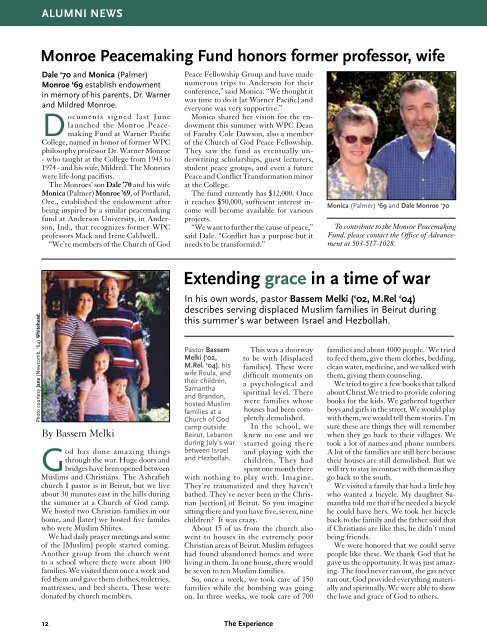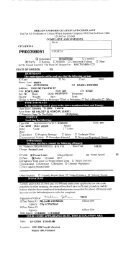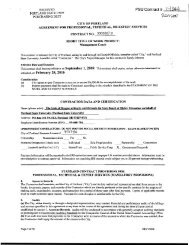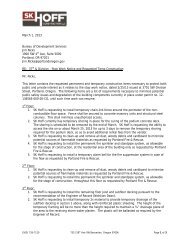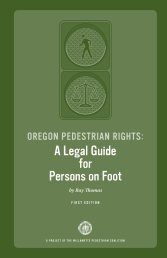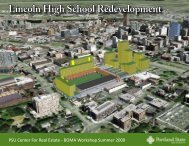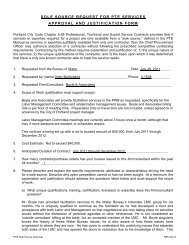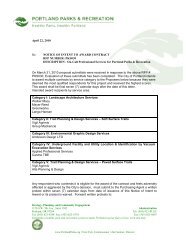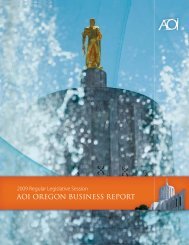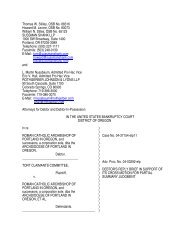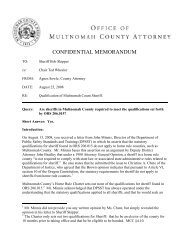Create successful ePaper yourself
Turn your PDF publications into a flip-book with our unique Google optimized e-Paper software.
ALUMNI NEWSMonroe Peacemaking Fund honors former professor, wifeDale ‘70 and Monica (Palmer)Monroe ‘69 establish endowmentin memory of his parents, Dr. Warnerand Mildred Monroe.Documents signed last Junelaunched the Monroe PeacemakingFund at Warner PacificCollege, named in honor of former WPCphilosophy professor Dr. Warner Monroe- who taught at the College from 1943 to1974 - and his wife, Mildred. The Monroeswere life-long pacifists.The Monroes’ son Dale ’70 and his wifeMonica (Palmer) Monroe ’69, of Portland,Ore., established the endowment afterbeing inspired by a similar peacemakingfund at Anderson University, in Anderson,Ind., that recognizes former WPCprofessors Mack and Irene Caldwell.“We’re members of the Church of GodPeace Fellowship Group and have madenumerous trips to Anderson for theirconference,” said Monica. “We thought itwas time to do it [at Warner Pacific] andeveryone was very supportive.”Monica shared her vision for the endowmentthis summer with WPC Deanof Faculty Cole Dawson, also a memberof the Church of God Peace Fellowship.They saw the fund as eventually underwritingscholarships, guest lecturers,student peace groups, and even a futurePeace and Conflict Transformation minorat the College.The fund currently has $12,000. Onceit reaches $50,000, sufficient interest incomewill become available for variousprojects.“We want to further the cause of peace,”said Dale. “Conflict has a purpose but itneeds to be transformed.”Monica (Palmer) ‘69 and Dale Monroe ‘70To contribute to the Monroe PeacemakingFund, please contact the Office of Advancementat 503-517-1028.Photo courtesy Jane (Newcomb, ‘64) Whitehead.By Bassem MelkiGod has done amazing thingsthrough the war. Huge doors andbridges have been opened betweenMuslims and Christians. The Ashrafiehchurch I pastor is in Beirut, but we liveabout 30 minutes east in the hills duringthe summer at a Church of God camp.We hosted two Christian families in ourhome, and [later] we hosted five famileswho were Muslim Shiites.We had daily prayer meetings and someof the [Muslim] people started coming.Another group from the church wentto a school where there were about 100families. We visited them once a week andfed them and gave them clothes, toiletries,mattresses, and bed sheets. These weredonated by church members.Extending grace in a time of warIn his own words, pastor Bassem Melki (‘02, M.Rel ‘04)describes serving displaced Muslim families in Beirut duringthis summer’s war between Israel and Hezbollah.Pastor BassemMelki (‘02,M.Rel. ‘04), hiswife Roula, andtheir children,Samanthaand Brandon,hosted Muslimfamilies at aChurch of Godcamp outsideBeirut, Lebanonduring July’s warbetween Israeland Hezbollah.This was a doorwayto be with [displacedfamilies]. These weredifficult moments ona psychological andspiritual level. Therewere families whosehouses had been completelydemolished.In the school, weknew no one and westarted going thereand playing with thechildren. They hadspent one month therewith nothing to play with. Imagine.They’re traumatized and they haven’tbathed. They’ve never been in the Christian[section] of Beirut. So you imaginesitting there and you have five, seven, ninechildren? It was crazy.About 15 of us from the church alsowent to houses in the extremely poorChristian areas of Beirut. Muslim refugeeshad found abandoned homes and wereliving in them. In one house, there wouldbe seven to ten Muslim families.So, once a week, we took care of 150families while the bombing was goingon. In three weeks, we took care of 700families and about 4000 people. We triedto feed them, give them clothes, bedding,clean water, medicine, and we talked withthem, giving them counseling.We tried to give a few books that talkedabout Christ.We tried to provide coloringbooks for the kids. We gathered togetherboys and girls in the street. We would playwith them, we would tell them stories. I’msure these are things they will rememberwhen they go back to their villages. Wetook a lot of names and phone numbers.A lot of the families are still here becausetheir houses are still demolished. But wewill try to stay in contact with them as theygo back to the south.We visited a family that had a little boywho wanted a bicycle. My daughter Samanthatold me that if he needed a bicyclehe could have hers. We took her bicycleback to the family and the father said thatif Christians are like this, he didn’t mindbeing friends.We were honored that we could servepeople like these. We thank God that hegave us the opportunity. It was just amazing.The food never ran out, the gas neverran out. God provided everything materiallyand spiritually. We were able to showthe love and grace of God to others.12The Experience


